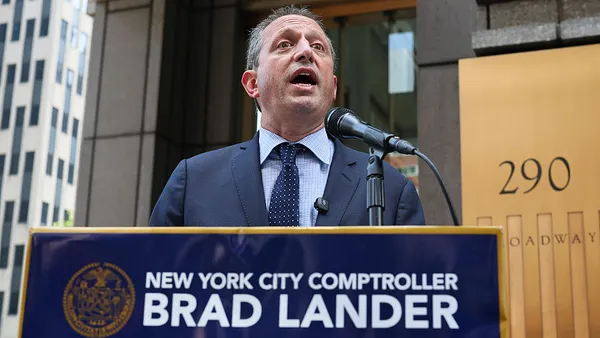Dive Brief:
- The Labor Department issued an advisory opinion that paves the way for Citigroup to move forward with a $1 billion Action for Racial Equity program announced in 2020 after the unrest that followed George Floyd’s murder earlier that year.
- Karen Lloyd, chief of Labor’s Division of Fiduciary Interpretations, penned the opinion last month after a partner at Thompson Hine LLP asked for the department’s input on the bank’s behalf. It’s the first advisory opinion the agency has sent since January 2020.
- Part of Citi’s plan includes subsidizing all or some of investment management fees for Citi-sponsored employee benefit plans managed by programs with targets for minority and women ownership. Lloyd said the program does not qualify the investment bank as a “fiduciary,” potentially providing a roadmap for the sector’s future diversity plans.
Dive Insight:
The agency’s opinion cleared up confusion about whether Citi’s commitments to subsidize the fees under its Diverse Managers program categorized it as a fiduciary and required it to abide by that set of standards laid out in the Employee Retirement Income Security Act.
While the bank itself is not a fiduciary under the ruling, the agency ruled that the investment committees appointed to oversee the program’s plans will fall under that categorization. The opinion points to Citi’s program falling under “settlor activities,” which relate more to the formation of a plan than its management. This means the program is exempt from the stricter standards fiduciaries face for plan performance.
“[B]ased on Citi’s representations regarding the program, the Department would not view Citi as a fiduciary with respect to the selection of investment managers under the Plans solely by reason of establishing the program or by paying or reimbursing the Plans for Diverse Managers’ fees,” Lloyd wrote.
The opinion allows the bank to move forward with its plans to invest $550 million in increasing home ownership by people of color, affordable housing and minority developers; $350 million in Black-owned business suppliers; $50 million in impact investing for Black entrepreneurs and $100 million each for supporting minority banks and grants to address racial equity.
A study the company published in 2020 found that closing the racial gaps for Black Americans in 2000 would have added $16 trillion to the U.S. economy by the time the report was published. Then-CEO Michael Corbat called addressing racism and closing the wealth gap the “most critical challenge we face in creating a fair and inclusive society” when announcing the initiatives.
Mark Mason, chief financial officer at the company, called the initiatives a starting point and said in 2020 that the bank is determined to help close the racial wealth gap.
“We are in the midst of a national reckoning on race, and words are not enough,” Mason said in the 2020 release. “We need awareness, education and action that drive results."
Citi said it won’t have numerical goals or similar quotas of members of its Diverse Managers program in order to get the investment fee reimbursements under the racial equity program, according to Lloyd’s letter. The bank will be required to provide a copy of the opinion and a legal presentation to each of the investment committees under the ruling.










